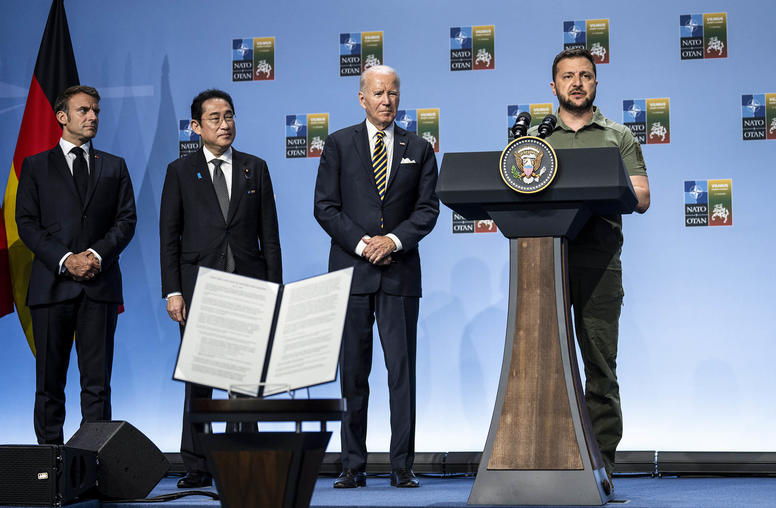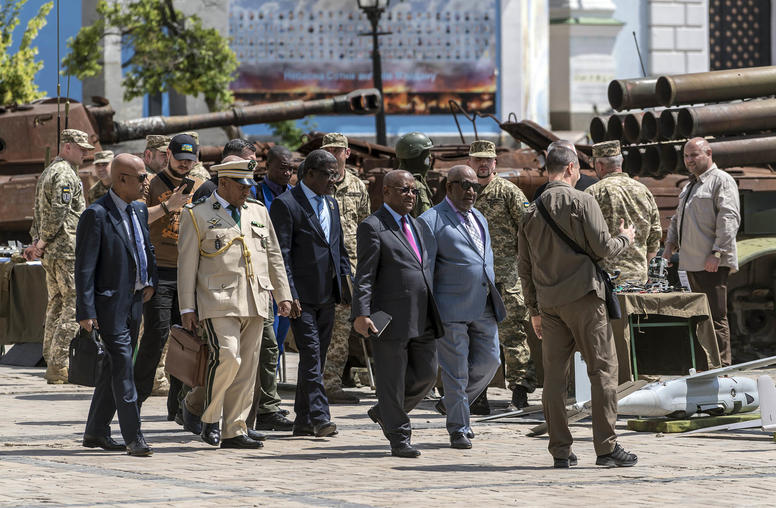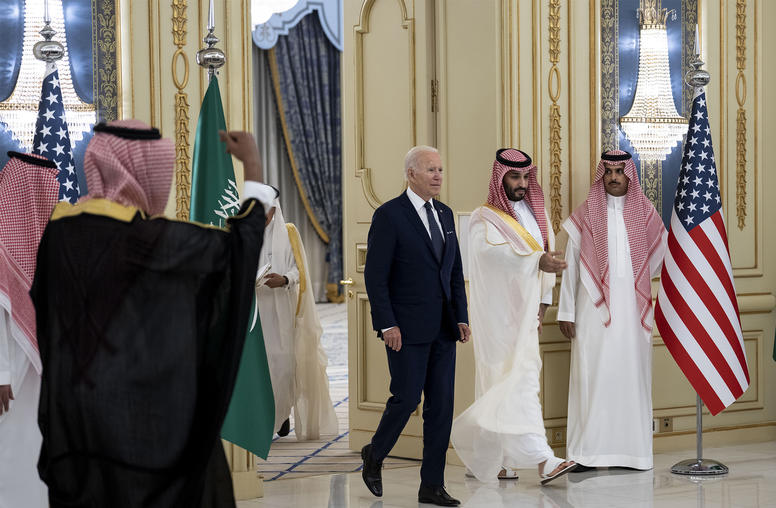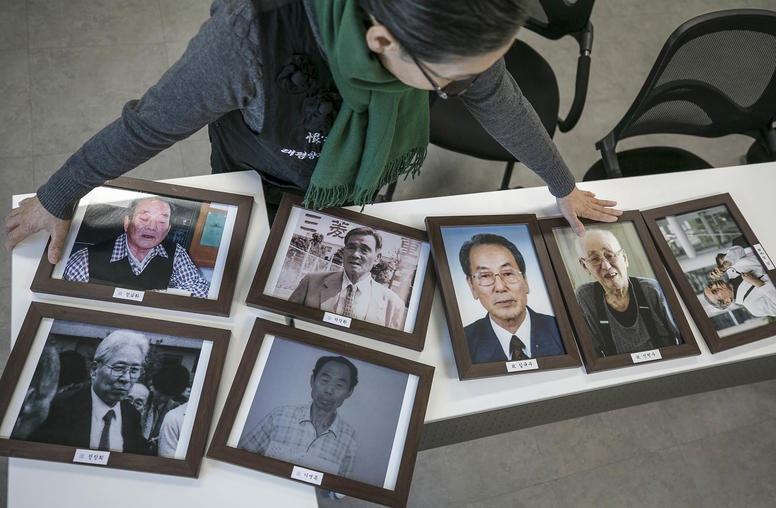Publications
Articles, publications, books, tools and multimedia features from the U.S. Institute of Peace provide the latest news, analysis, research findings, practitioner guides and reports, all related to the conflict zones and issues that are at the center of the Institute’s work to prevent and reduce violent conflict.

Ukraine is advancing its peace plan. The U.S. can help.
While Ukraine’s counteroffensive against Russia’s invasion has global attention on the battlefield, President Volodymyr Zelenskyy’s government is also busy advancing a diplomatic initiative: a peace summit to build momentum and cohesion among international partners on its 10-point peace plan. The United States should be a leader in backing this diplomatic effort — which is on the agenda this weekend in multilateral talks in Saudi Arabia. Broadening international buy-in for Ukraine’s peace plan serves U.S. interests. It can short-circuit less constructive peace initiatives and reinforce a cardinal international norm: An aggressor that launches an unprovoked war can't expect to set the terms for peace afterward.

Why We Should Back Ukraine’s Diplomatic Long Game
A number of commentators have criticized Ukrainian President Volodymyr Zelenskyy’s latest peace summit in Jeddah for failing to produce tangible deliverables. What these criticisms miss is that Ukraine is playing a game of diplomatic attrition aimed at countering Russia’s central objective: international acquiescence to its violent seizure of a neighbor’s territory. The United States should support Ukraine’s efforts, most immediately by seeking a U.N.-sanctioned conference on the sidelines of next month's U.N. General Assembly session.

Is a Saudi-Israel Normalization Agreement on the Horizon?
In recent months, a drumbeat has built around the U.S. effort to negotiate a normalization agreement between Israel and Saudi Arabia. The deal would be a tectonic shift in Middle East geopolitics, but also carries major implications for other actors beyond the three negotiating parties. Israel would, of course, benefit from normalized relations with the Saudis — long seen as the “holy grail” of potential normalization agreements for the country. The Saudis, in turn, would see their interests advanced through strengthened U.S partnership in key areas. But this deal could also have serious implications for the future of the Palestinian national movement and, further afield, for the role of China in the Middle East.

Learning from Failed Peace Efforts in Afghanistan
Over the course of 20 years, the United States made strategic mistakes in its war with the Taliban that helped fuel the insurgency and likely precluded an earlier end to the war. The U.S. government became fixated on a purely military solution, to the neglect of a political solution. This overwhelming focus on dealing the Taliban a decisive defeat was reinforced by the perceived political risks of negotiating a peace agreement with an organization that was seen solely through the lens of the war on terror. The United States should learn from its experience in Afghanistan and the opportunities it missed to reach a better and faster outcome to the war.

The Next Five Years Are Crucial for Bougainville’s Independence Bid
Now that Papua New Guinea Prime Minister James Marape has been reelected, the stage is set for him to settle what he has called the biggest issue facing the country — the future political status of Bougainville, an autonomous region seeking independence by 2027. Papua New Guinea is unlikely to let it secede, but Bougainville is unlikely to settle for anything less than full independence, and positive relations between the two governments will be of paramount importance in the coming years. Meanwhile, intensifying U.S.-China competition in the South Pacific creates wider implications for Bougainville’s potential independence.

How Religious Actors Can Help Address the Western Hemisphere’s Biggest Challenges
On the sidelines of this year’s Summit of the Americas, the Interreligious Forum of the Americas brought together over 100 religious actors, faith-based organizations and governments to discuss how strategic engagement with religious and interreligious actors can help address the hemisphere’s most pertinent issues.

Acknowledging U.S. Missteps Can Ease Japan-South Korea Relations
History sits at the heart of the frigid relationship between South Korea and Japan. Not just the history of Japanese imperialism, but also the history of U.S. strategic interests since 1945. U.S. decision-making stemming from such interests — at first framed within the context of fighting the Cold War and now defined by U.S. competition with China — has oftentimes exacerbated long-term South Korea-Japan relations in its pursuit of expedient solutions and limited the opportunities and avenues for reconciliation.

Peacebuilding Needs Local Partners — But How Do You Define ‘Local’?
The Global Fragility Act (GFA) marked the launch of a new U.S. government approach to conflict prevention and stabilization abroad. Notably, this new approach includes a commitment to locally-driven solutions — a reflection of the peacebuilding community’s growing emphasis on the local dimensions of peace and conflict.

Different Wartime Memories Keep Japan and South Korea Apart
The current state of relations between South Korea and Japan is, in the judgment of many observers, the worst since normalization in 1965. Despite decades of interaction, cooperation and even integration, relations between South Korea and Japan seem to have reverted to a dysfunctional status in which even the most basic forms of diplomatic intercourse present a challenge.

Resolution of Korean Forced Labor Claims Must Put Victims at the Center
In 1965, Japan and South Korea signed numerous treaties and agreements to normalize relations, including the Treaty on Basic Relations reestablishing diplomatic relations and a Claims Agreement settling property claims among the two countries and their nationals. These agreements have failed to resolve bilateral tensions stemming from the claims of Koreans who were subjected to forced labor by Imperial Japan during World War II. Some parties have called for a legal resolution based on the arbitration clause in the Claims Agreement. However, major issues would arise if the two countries pursued arbitration.